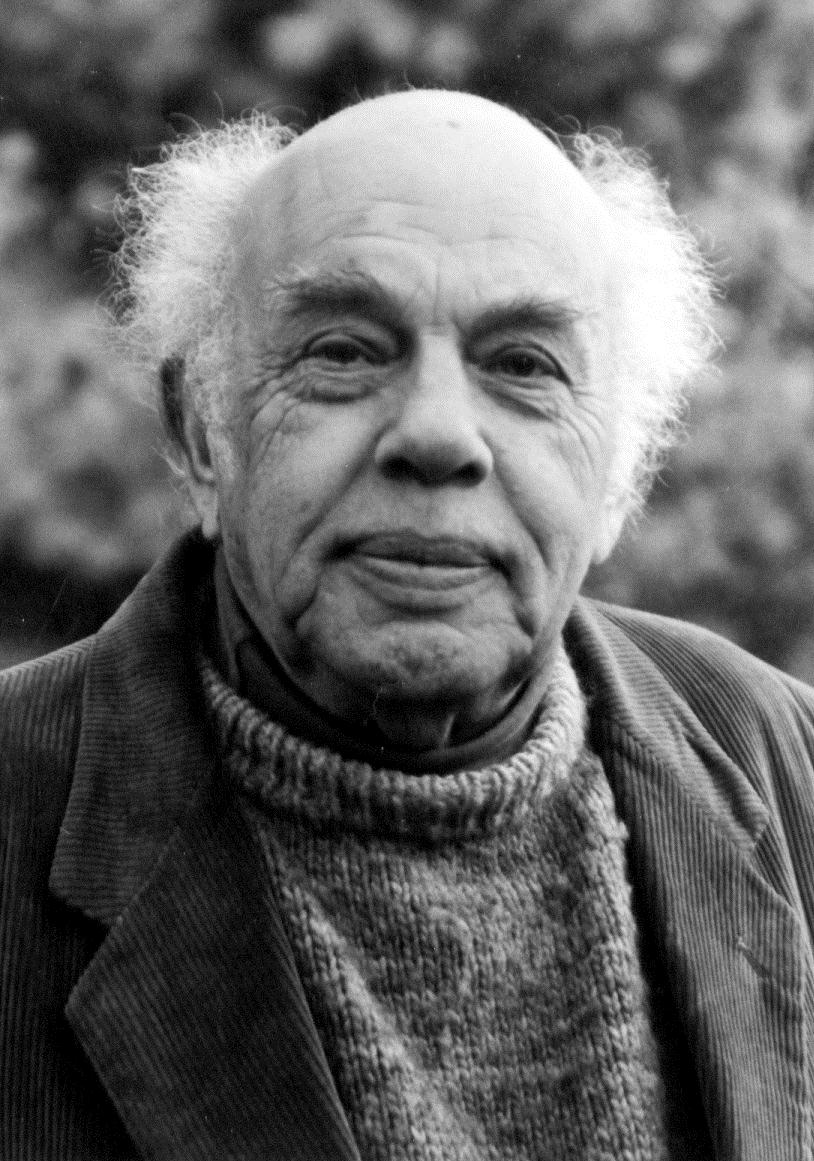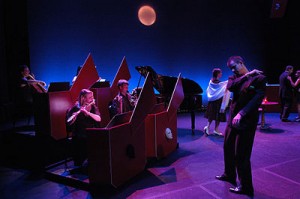It’s still so unbelievable and so marvelous, that John Cage would be able to perform such a piece on national television, on a game show! It’s the sort of thing that was not supposed to be possible before the Internet, but there it is, and at the time it was shown there was little chance that the federal government knew who was watching it.
“Water Walk” seems to me to be convivial, like a party, with the same aesthetic values as “Living Room Music,” something that friends should enjoy together in an intimate setting. It can be performed by anyone with the time and equipment to prepare and an inclination for quick thinking and good humor. I think Jenny Q. Chai has most of those qualities, but she’s a busy musician with many demands on her time, and in the living room concert venue, Spectrum, on May 7, she was a little flustered and a little rushed as she checked the running time on her iPhone and moved from object to object. Practicing the piano is one thing, setting up and knocking down all the bric-a-brac on tables, and doing it again and again, is a challenge on time that I don’t image Cage expected many musicians to undertake.
But in the context of the concert, and in the Spectrum setting with books lining the walls and easy chairs and couches, it was a convivial encore, a trick at the end of a good party. The party was a collection of old and new pieces, set together into short suites. Chai is known for her playing and her programs that demolish distinctions between past and present and show that the Western classical tradition is an endless flow, no part of it beyond the reach of any composer or the ears of any listener. The program was called Acqua Alta, the music having in some way to do with water.
She’s not the only musician who does this — most prominently in my mind is Marino Formenti — but she does so without didacticism, which is unusual and compelling. She plays the music with great skill, intelligence and commitment, but she doesn’t belabor her points or our need to hear what she hears, and as a critical listener I have utmost respect for that. I don’t think all the music she played in Aqua Alta was successful, but I was left feeling that everything she played was offered as it should be.
The opening suite sandwiched Kurtag’s “Hommage à Scarlatti,”, a couple Scarlatti Sonatas, and Gibbons’ “The Italian Ground” with premieres from Milica Paranosic and Nils Vigeland. Scarlatti’s are some of the finest keyboard works in the literature, and Chai played them with accuracy and insouciance, an ideal combination. All the older works put the new ones in difficult contrast, their combination of craft and the focussed exploration of controlled ideas set an example that Paranosic’s underdone, programmatic and overlong minimalism couldn’t match, Vigeland’s “I Turisti” sounded great, but the result didn’t match his own description, the composition too clear to encompass the sound of chattering tourists that was somehow supposed to drown out the music.
The large scale piece on the program was a new work from Michael Vincent Waller, “Acqua Santa,” that started modestly but grew into an ambitious and attractive work. Waller’s basic pulse both lengthens and picks up the pace as the music moves along, the structure builds from monophony to homophony, and there’s some of the pleasantly mesmerizing quality of watching waves from the shore. It’s essentially minimal without being minimalist in the repetitive sense, and the appearance of whole-tone scales develops an impressionistic aesthetic that elided nicely with the closing set of pieces: Ravel’s “Une Barque Sur L’océan,” Debussy’s prelude to “La cathédrale engloutie,” and Liszt’s “La lugubre gondola,” finished off with Marco Stroppa’s effective adaptation of a traditional lullaby, “Ninnananna.” This whole stretch of the concert was involving and powerful. While even the most sensitive, intelligent listener has to navigate their way through how a brand new piece should go, it’s easy to hear exceptional Ravel, Debussy and Liszt. Chai is great in this music: she has the technique to pull it off, the power to play it with expression and confidence, and the intelligence to make it coherent and meaningful. There are few musicians who can play both Scarlatti and Liszt naturally and convincingly — Formenti is one, there’s Mikhail Pletnev — and Chai does it. She plays Cage well too, and probably no one but the man himself can pull off “Water Walk.”
http://youtu.be/1HMqYnBiUbI
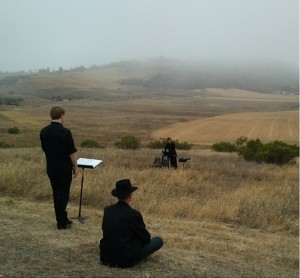
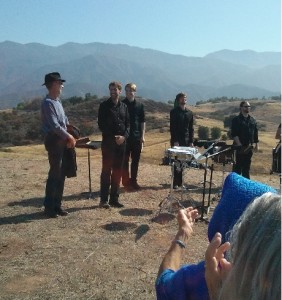
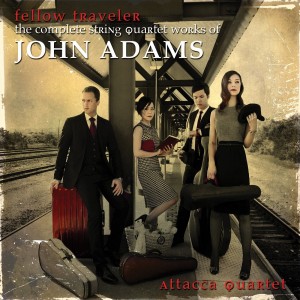
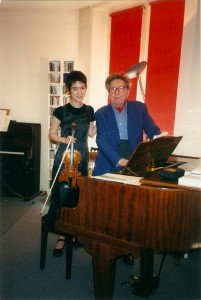 My visit to Henri Dutilleux was part of one of the most beautiful summers I’ve had. I stayed for several weeks in Paris just before beginning my doctoral degree. I was determined to pass out of the language-course requirement, so I rented a little apartment on the Rue du Cardinal-Lemoine and immersed myself in French, reading twenty pages a day, chatting with storepeople and watching French talk shows on TV. Besides exploring the city and making day trips to Chartres and Auvers-sur-Oise, I visited many museums, including the small ones (Bourdelle, Zadkine), and heard music at the Salle Pleyel (Krystian Zimerman), Cité de la Musique (Ensemble Intercontemporain in Carter, Kurtag and Dalbavie), Théâtre du Chatelet (Bluebeard’s Castle) and Bastille Opera (Renée Fleming in Manon). Meanwhile I practiced every day, and sometime in the middle of my stay, I called up Henri Dutilleux.
My visit to Henri Dutilleux was part of one of the most beautiful summers I’ve had. I stayed for several weeks in Paris just before beginning my doctoral degree. I was determined to pass out of the language-course requirement, so I rented a little apartment on the Rue du Cardinal-Lemoine and immersed myself in French, reading twenty pages a day, chatting with storepeople and watching French talk shows on TV. Besides exploring the city and making day trips to Chartres and Auvers-sur-Oise, I visited many museums, including the small ones (Bourdelle, Zadkine), and heard music at the Salle Pleyel (Krystian Zimerman), Cité de la Musique (Ensemble Intercontemporain in Carter, Kurtag and Dalbavie), Théâtre du Chatelet (Bluebeard’s Castle) and Bastille Opera (Renée Fleming in Manon). Meanwhile I practiced every day, and sometime in the middle of my stay, I called up Henri Dutilleux.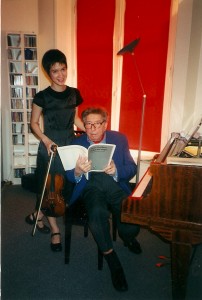
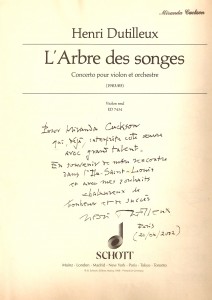 I recently saw Dutilleux’s short posthumous homage to Elliott Carter, in which he said that they did not meet much and that he had few specific memories besides of “a nice and strong character, a very charming man, and though we were far from each other – the Atlantic Ocean between us – I remain close to him and his music.” That June day was my only meeting with Dutilleux, but it was very meaningful for me to meet the creator of this music, and to play his substantial work under his curious and attentive gaze. He reminded me of certain great artists I’ve known, who share a simplicity and contentedness in their way of living that comes, I feel, from their satisfaction in their work and their love for what they do. Listening to recordings, I again relish his music’s generous ardor and stimulating clarity, luscious warmth, sweeping ebb and flow, big-band homophonic blocks of harmonies, and sense of spaciousness between the deep low register and the radiant highs. I respect his fastidiousness in composing but I dearly wish he had been more prolific in writing chamber and solo works that we could play and program. Having few pieces of his to play, I feel about his music much as I do about my meeting with him – truly delighted and wanting more chances to engage directly. He definitely left us wishing for more.
I recently saw Dutilleux’s short posthumous homage to Elliott Carter, in which he said that they did not meet much and that he had few specific memories besides of “a nice and strong character, a very charming man, and though we were far from each other – the Atlantic Ocean between us – I remain close to him and his music.” That June day was my only meeting with Dutilleux, but it was very meaningful for me to meet the creator of this music, and to play his substantial work under his curious and attentive gaze. He reminded me of certain great artists I’ve known, who share a simplicity and contentedness in their way of living that comes, I feel, from their satisfaction in their work and their love for what they do. Listening to recordings, I again relish his music’s generous ardor and stimulating clarity, luscious warmth, sweeping ebb and flow, big-band homophonic blocks of harmonies, and sense of spaciousness between the deep low register and the radiant highs. I respect his fastidiousness in composing but I dearly wish he had been more prolific in writing chamber and solo works that we could play and program. Having few pieces of his to play, I feel about his music much as I do about my meeting with him – truly delighted and wanting more chances to engage directly. He definitely left us wishing for more.